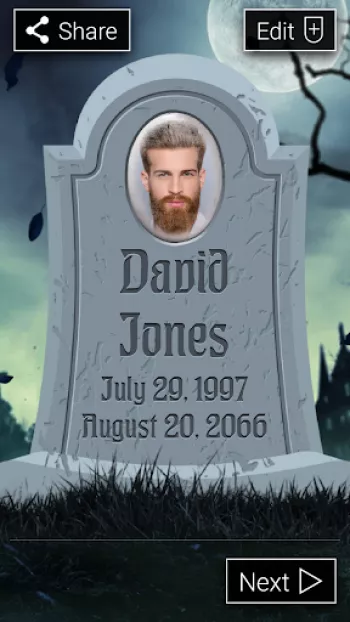Apps Home

The Fascination with Predicting Life’s Final Destination
In a world enthralled by the mysteries of life and the inevitability of death, the fascination with predicting our personal expiration date has taken on new forms in the digital age. Humans have forever been captivated by foresight, seeking glimpses into the future through arcane means or pragmatic tools. In earlier times, seers and prophets might have offered insights into our futures, but today, thanks to technological advancements, apps like "Death Date Calculator & Grave Editor" bring the concept of predicting one's death into the realm of entertainment and curiosity. The essence of curiosity about mortality can be linked to how humankind grapples with the unknown and seeks control over the uncontrollable. From a psychological perspective, the desire to understand one's lifespan can be tied to existential questions of purpose, legacy, and the apprehension of the unknown. Despite being presented under a guise of jest, applications like this utilize complex algorithms, sorting through data about health, lifestyle choices, and personal habits to envisage an ending date. Although the outcome should not be taken literally or seriously, it satiates the curiosity of those interested in the hypothetical, merging entertainment with the perennial fascination of foreseeing fate. It raises intriguing questions about how we interact with technology to interpret such serious themes in a form that entertains rather than alarms.
Understanding the Algorithm Behind the Prediction
At the heart of the "Death Date Calculator & Grave Editor" app lies an algorithm that processes a variety of personal data inputs to estimate a potential date of death. The process starts when users provide fundamental details such as their date of birth and country of origin. Following these initial inputs, the app delves deeper into variables that significantly impact life expectancy. Users are prompted to answer a series of detailed questions that explore their health status, lifestyle habits, and any potential addictions or hazardous activities they engage in. Each answer contributes a data point that the algorithm uses to perform its calculations. From a technical standpoint, algorithms like this one employ statistical models drawn from epidemiology and data science. These models utilize known correlations, such as the effects of smoking or exercise on life expectancy statistics, to predict outcomes for individuals. For example, a person who reports exercising regularly and maintaining a healthy diet will likely receive a different prediction compared to someone leading a sedentary lifestyle with unhealthy eating habits. The app aggregates this data to simulate the statistical probability of various lifespans, offering users an estimated date of death. Despite the robust mechanics driving the calculations, it’s emphasized that the resulting date is a form of digital conjecture rather than a deterministic forecast.
Personalizing the Concept of Mortality
One of the more unique aspects of the app is the creative spin it offers through the virtual construction of a personalized gravestone. Post prediction, users are given the opportunity to design their own tombstones, weaving an element of personalization into the exploration of mortality. The app presents a selection of 16 different gravestone designs, varying in material aesthetics such as granite, marble, and sandstone, thereby allowing creative expression within this morbid curiosity. Furthermore, users can customize details on their virtual tombstone, such as engraving a name, selecting a date format, and crafting an epitaph, which transforms the digital concept into a tangible representation of self-reflection on one's legacy. This personalization aspect integrates psychological and emotional dimensions, prompting users to confront the notion of their mortality in a contemplative and constructive manner. By offering the capability to attach photos, either from the device’s gallery or captured in real-time, the app enhances the personal connection users experience with the digital memorial they create. This creative endeavor could serve as a reflective exercise to ponder life's transient nature and the memories one wishes to leave behind. Once completed, the gravestone can be shared on social media, blending the line between private introspection and public sharing.
The Entertaining Nature and Social Dynamics of Mortality Apps
Despite the dark undercurrent of predicting death, apps like the "Death Date Calculator & Grave Editor" thrive on entertainment value and curiosity. Within social contexts, they emerge as conversation starters, offering humor-inflected provocations rather than somber meditations on death. By turning an age-old contemplation into an amusement, these apps encourage both solitary amusement and communal sharing. Friends may challenge each other to compare predictions or engage in the playful creation of digital tombstones, fostering deeper conversations about life values and shared experiences. Moreover, the app integrates elements of gamification by enticing users to explore additional gravestone designs and tools, some of which may be premium features. Gamification entices users to engage more deeply and consistently, fostering a unique form of reflection on mortality woven into everyday digital interactions. The inherent social dynamics of these apps reveal our collective capacity to embrace mortality with levity, supporting social bonds through shared experiences and laughter. This communal aspect underscores a deeper cultural shift where mortality, typically a private and profound topic, becomes a playful encounter, diffused into our everyday digital landscapes.
Download and Explore: The Digital Journey to Your End
For those intrigued by the prospect of discovering their hypothetical time left or crafting a personalized digital tombstone, accessing the "Death Date Calculator & Grave Editor" is straightforward. Those using Android devices can engage with its features by navigating to the platform's digital marketplace. By doing so, users step into an intriguing world that reflects modern society's complex relationship with mortality. The app stands as a testament to the blending of technology, entertainment, and personal introspection. Future iterations of such applications could introduce more interactive elements, integrate augmented reality for more immersive experiences, and expand databases to refine prediction accuracies further, albeit with the continuing caveat of entertainment rather than scientific accuracy. In a world increasingly defined by digital experiences, tools like the Death Date Calculator exemplify how technology can transform profound existential questions into engaging, albeit fantastical, explorations. For Android enthusiasts curious to embark on this digital contemplation of mortality and humor, the app invites you to imagine your end while cherishing the life lived thus far. Venture forth into this playful contemplation with a tap on your screen, forging a light-hearted path through one of life's perennial mysteries. Discover your hypothetical time left by beginning the journey to fun-filled deathdate speculation on Android through the link: Download for Android.
Share Your Opinion
Your Email Will Not Be Published.
All Rights Reserved © Apps Home 2025













































Anita Lassiter
Reminds you that you better take good care of yourself. I really like this app. I downloaded it after watching the movie,"Countdown". The countdown...
Energy Wachale
I love this app because it entertain me very much and tell me what to do to live longer age!!!!!
Wommad Ammad
I never pass without appreciating this app, It's nice app to predict the age of person.
Asmarah Waseem
Ok so I love it it says I will live for 72 years more that is such a good news for me cause I turned 27 this month and I'm happy to see that I will...
Renata Kirilaite
Super fun and if I'm being honest it's worth downloading and the fact it's for free is amazing! I had lots of fun